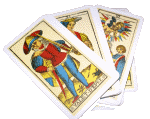
Bohemian Gothic Tarot
SIX OF CUPS
Lighter or more conventional meanings
Innocence * Happy memories, particularly of childhood * Indulging in simple, childlike pleasures * Children and issues of childhood * Being vulnerable or a little naive.
Darker, shadow or more hidden meanings
An innocent facade, but what does it hide? * Corruption or loss of innocence * Acting old before your time * An unhappy or disturbed childhood * Losing yourself in nostalgia and regrets * Wanting to stay young forever * Hiding some ulterior motive under an apparently sweet and naive act.
Two children stand in front of a grave. One carries a wreath, the other a sweet pot of flowers. This might be any conventional Victorian mourning picture, except for some oddities. It's almost night, with dark clouds gathering, and seems late for such young children to be out, especially as they seem to be on their own - there's nobody else around. The children are visiting a graveyard, but they aren't in any way dressed in the conventional black, grey or mauve formal garments of mourning. In fact their clothes are quite casual, the girl dressed as if for gardening, the boy almost festive, with his pink shirt and the jaunty feather in his cap. They also don't look sad, in fact their stares are intense and almost challenging - these two seem very self-confident.
The more we look at this image, the more unsure we become about the sweetness and innocence of the children. There is, in fact, something almost inhuman and unnerving about their perfect faces and hard gazes. They are young, pretty and, it seems, bereaved, so questioning their goodness seems harsh. Yet when we look into their faces, we feel that there is something strangely cold about their expressions.
The attitude to children in Gothic literature is often an uncomfortable and even fearful one. From the ambiguities of the actions of the brother and sister in Henry James' The Turn of the Screw right up to the present day child ghosts of Stephen King's The Shining, children are often portrayed as threatening, in some way hiding corruption beneath a mask of purity and harmlessness. This card reflects that Gothic discomfort, and asks us, when we draw it in a reading, to look at why we are sometimes suspicious of apparent innocence. It's interesting to remember that in The Turn of the Screw it's never clear whether the children are in reality under an evil influence, or if this is all in the deranged imagination of their governess. Similarly, in this card, we have to wonder if the children are in fact wicked - and could in fact have killed the person who has been buried. In this case, they might be coming to the grave to celebrate rather than to mourn. But these more horrifying possibilities are possibly a figment of our own fantasies, and we may be reading more threat into the image than is justified. Innocent or not? This scene leaves it open for us to decide.
In a reading, the interpretation of this card is likely to be much influenced by the cards around it. If, for instance, it came up near cards such as Justice (which in The Bohemian Gothic Tarot is mostly about dark injustices), the Five of Swords and another Sword, then we might be inclined to see the children as guilty of some nasty act (or not regard them as children at all, but rather some kind of demonic figures, or simply bad influences, in disguise). However, alongside The Sun, the Three of Cups and, let's say, a Pentacle, we would be more likely to interpret these children as genuine innocents.
As ever in tarot, it's a matter of going with your intuition in the light of the question being asked - especially when an image has as much built-in ambiguity as this one. Questions of innocence are, after all, often hard to decide and this card asks us to think carefully before making up our minds.
Some further ways to consider this card
There are many cards in this deck that show children. Pull out some of these, for instance The Sun, The Empress, the Page of Pentacles and the Seven of Swords. Divide them into two piles, those in which you think they are portrayed as good or innocent, and those in which you think they are wicked, threatening or in some other way not straightforward, simple children. Why did you come to this conclusion for each card?
Flora continued to fix me with her small mask of reprobation, and even at that minute I prayed God to forgive me for seeming to see that, as she stood there holding tight to our friend's dress, her incomparable childish beauty had suddenly failed, had quite vanished. I've said it already - she was literally, she was hideously, hard; she had turned common and almost ugly.
- Henry James, The Turn of the Screw.









